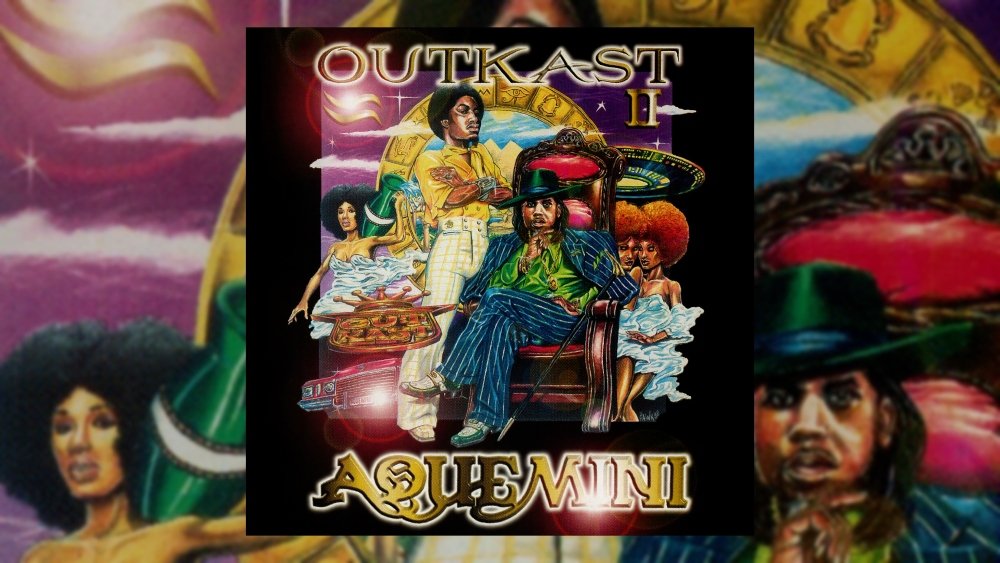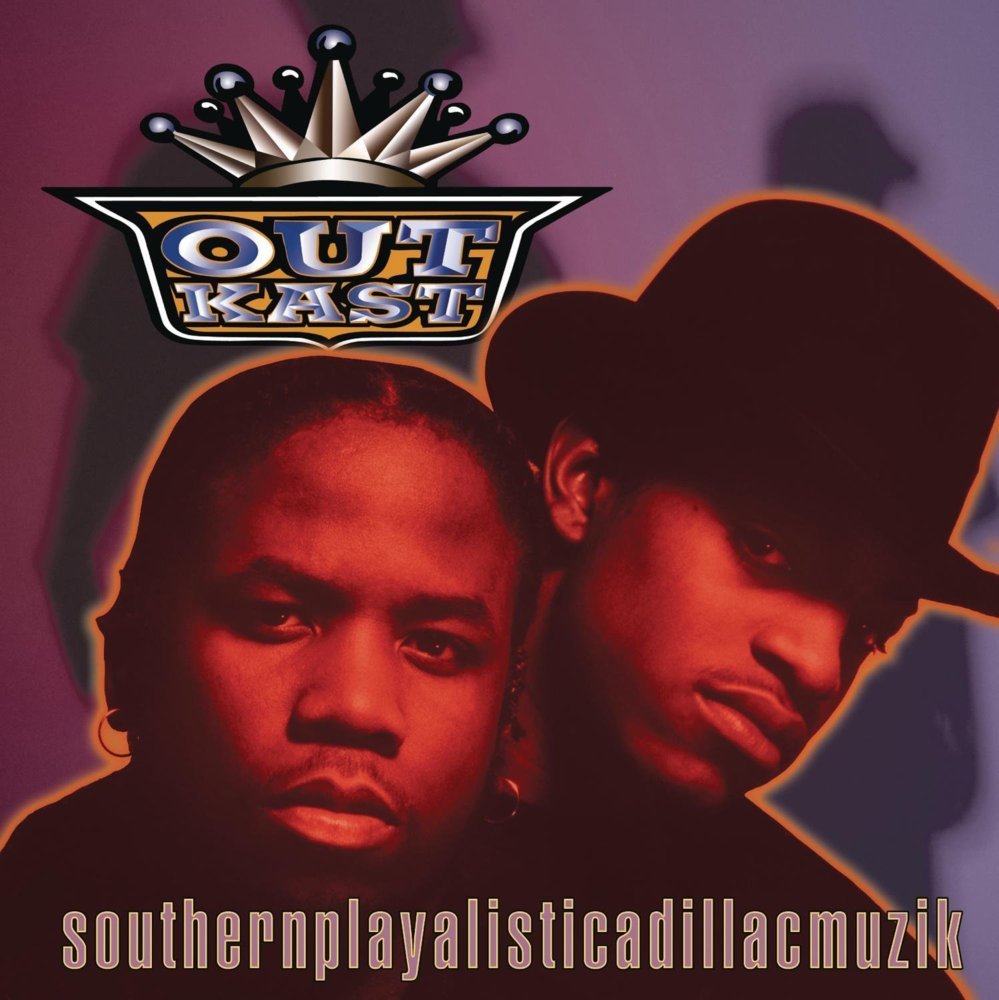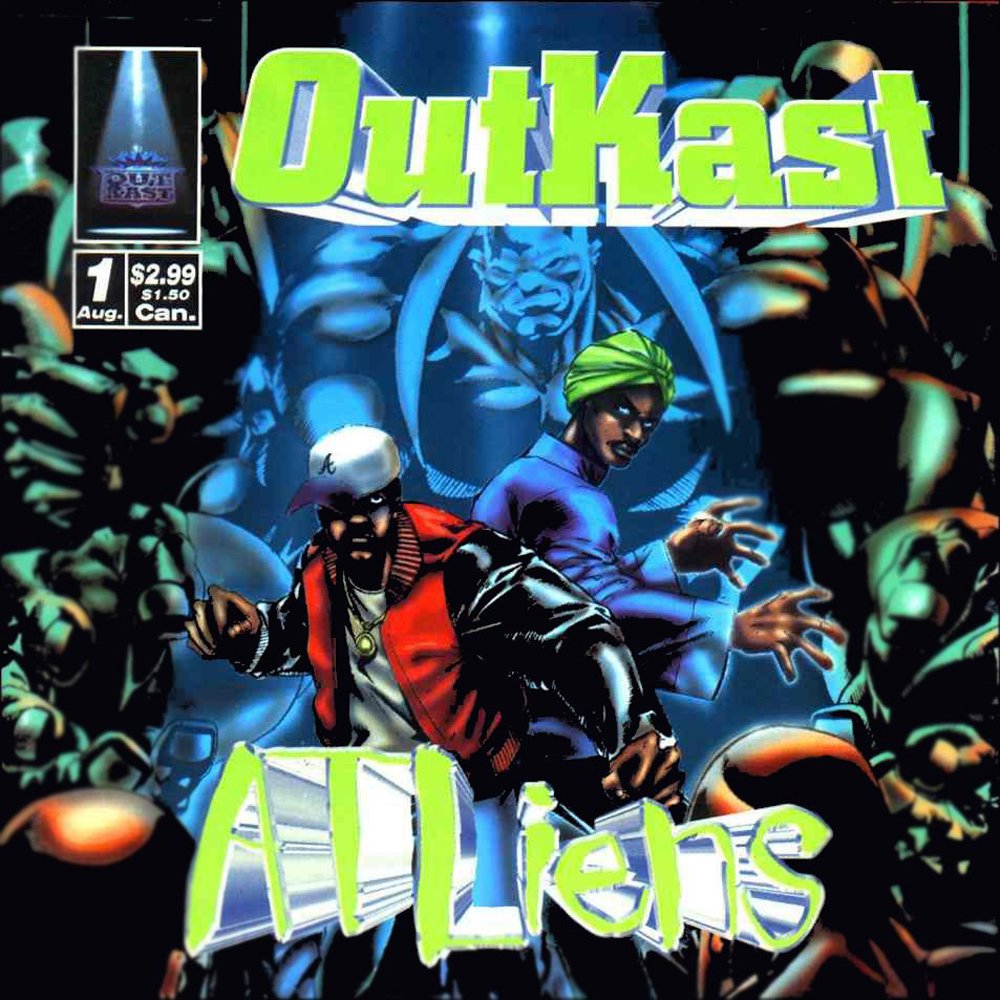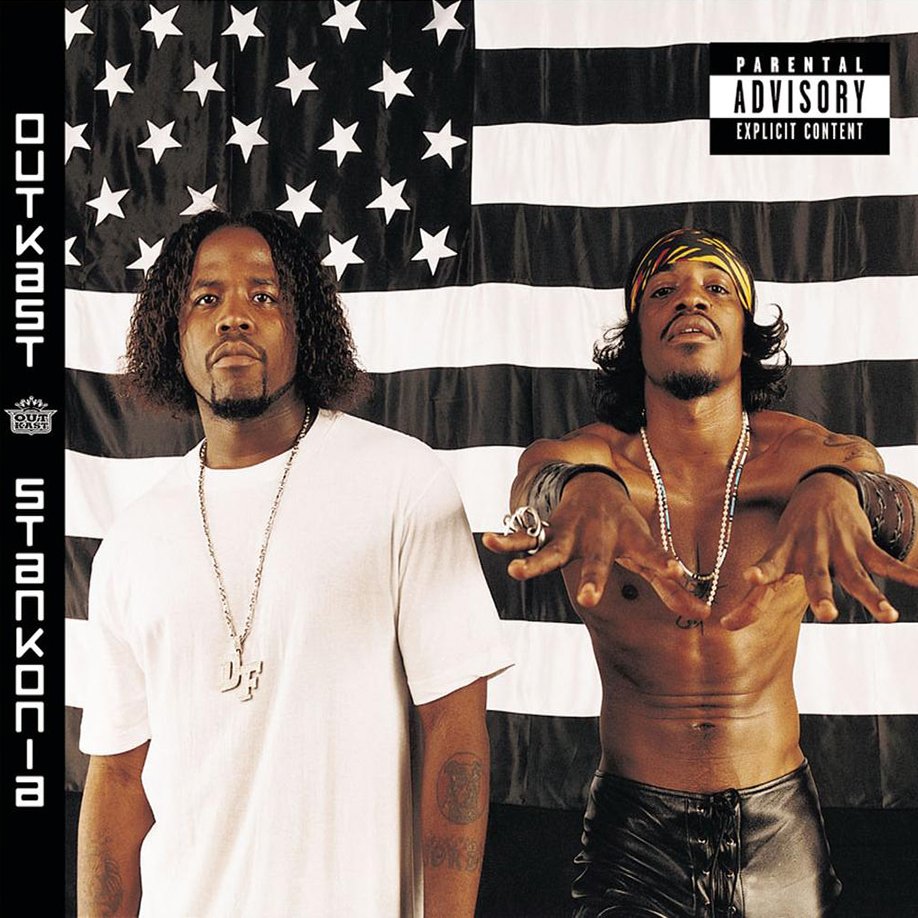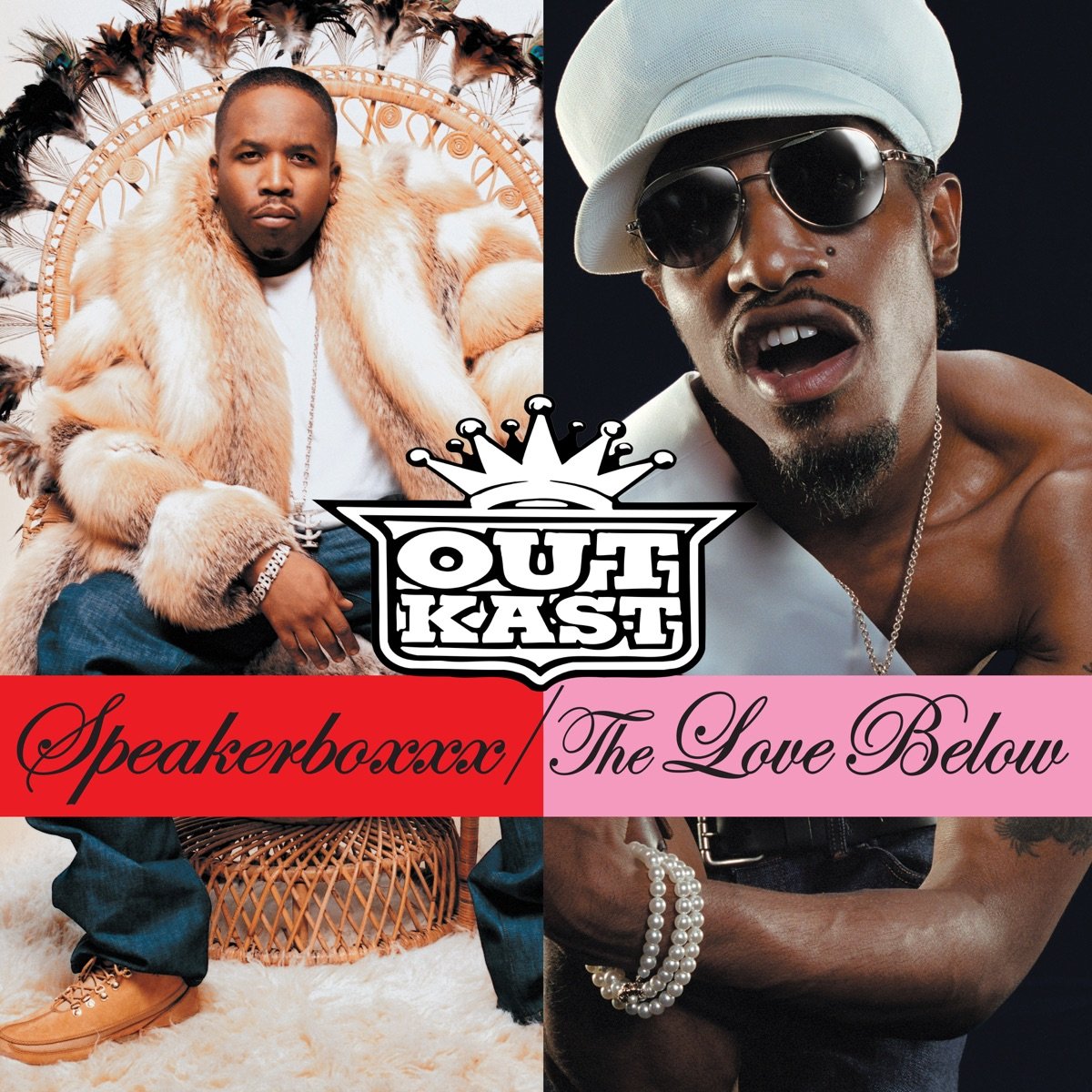Happy 25th Anniversary to OutKast’s third studio album Aquemini, originally released September 29, 1998.
The majority of musical artists are risk averse. Most find their lane and like to stick with it, never really leaving their comfort zones in any meaningful way. There’s nothing inherently wrong with an artist sticking with what they’re good at, playing to their strengths and delivering the type of album that they’re good at creating.
Few artists really switch up their approach from one album to the next. And many that do experiment head back to the mean soon afterwards. But a select few really grow artistically as their careers progress. Even fewer challenge their listeners to come along with them on their journey, encouraging them to forget what they thought they knew about their music and keep them guessing about what’s coming next.
OutKast are one of the special groups. Made up of André “3000” Benjamin and Antwan “Big Boi” Patton, they entered the hip-hop scene sounding one way, then evolved to use another approach and message. And by their third album, Aquemini, released 25 years ago, they evolved even further still. When Big Boi proclaims “Even though we got two albums, this one feel like the beginning” on “Y’all Scared,” he’s not wrong. Aquemini feels like a rebirth of a duo that’s already experienced multiple rebirths.
The central theme of Aquemini is the meshing of musical styles and sensibilities. Specifically, it’s about the continued convergence of André 3000 and Big Boi’s personalities. Throughout the duo’s previous two albums, André played the role of the more abstract explorer, while Big Boi settled into his position as the street-wise former B-Boy. On Aquemini, each of them embraces what makes them gifted artists and works to create a musical “middle ground” that allows each to play to their strengths, while still ending up greater as a whole.
After the commercial success of their debut LP Southernplayalisticadillacmuzik (1994) and its follow-up ATLiens (1996), OutKast was given more leeway by their label, LaFace Records, to be a little more experimental with their next album. The duo chose to go the less traditional route on the musical end. The majority of the production on Aquemini is handled by OutKast, as well as Mr. DJ, the group’s longtime DJ. All had learned production techniques through their time with their mentors, Organized Noize.
There is a vast use of live instrumentation throughout Aquemini. By 1998, using live instrumentation in hip-hop production wasn’t revolutionary in and of itself. However, many artists had utilized it by having musicians essentially replay hip-hop styled beats. To be clear, Aquemini features some of this as well, but it also makes use of live instrumentation in more creative and innovative ways.
Watch the Official Videos:
“Return of the G” opens the album perfectly, as it’s a slow-rolling, almost majestically funky track that features André and Big Boi addressing questions about the group’s status over a replayed version of Giorgio Moroder’s “Theme from Midnight Express.” André starts the song breathing lyrical fire, dismissing all doubters and nay-sayers with lines like, “Them n***as that think you soft and say ‘Y’all be gospel rapping / But they be steady clapping when you talk about / Bitches, and switches, and hoes, and clothes, and weed / let's talk about time traveling, rhyme javelin / Something mind unraveling.” He then dismisses the notion that he’s somehow lost touch with reality, as they wonder “Is he in a cult? Is he on drugs? Is he gay? / When y’all going to break up? When y’all going to wake up? / N***a, I'm feeling' better than ever, what's wrong with you?” Meanwhile, Big Boi plays things even more laid back, assuring the listener that “A n***a don't want no trouble / A playa just want to kick back with my gators off and watch my lil' girl blow bubbles.”
The first real inklings that Aquemini is going to be a special experience comes from its lead single “Rosa Parks.” The track is ostensibly about OutKast taking the road less travelled and elevating its music to the next level in the process. While Big Boi describes their mission to craft something truly original, André describes some “life game” imparted to him by a gypsy (likely Erykah Badu, the mother of his child). The song possesses a distinctively Southern flair, right down to its harmonica-led breakdown, complete with raucous handclapping and foot stomping.
Rosa Parks herself filed a lawsuit against the group for using her name without the proper permission, which, after lengthy legal maneuvers and battles, was settled out of court in 2005. André later said he had spoken with Ms. Parks’ relatives, and that they’d revealed the lawsuit was the result of her attorneys looking for money.
The album’s title track is a spacey almost surreal exercise that explores another central theme of Aquemini: the impermanence of success and the inexorable passage of time. Knowing that everything comes to end, the two resolve to do their best to create a lasting impression. For his part, Big Boi stresses to young up-and-comers that they shouldn’t spend their money impractically, rapping, “If you ain't got no rims, n***a, don’t get no wood grain steering wheel / For real, you can go on chill out and still build, let your paper stack / Instead of going into overkill, pay your fuckin' beeper bill, bitch.”
André is in a zone throughout the track, particularly blacking out during his second verse, where he contemplates ways to make himself a better person. “My mind warps and bends, floats the wind, count to ten,” he states. “Meet the twin—André Ben, welcome to the lion’s den / Original skin, many men comprehend / I extend myself so you go out and tell a friend / Sin all depends on what you believing in / Faith is what you make it—that's the hardest shit since MC Ren.”
Another pair of Aquemini’s heralded offerings are both entries in “Da Art of Storytellin’,” which further demonstrate the pair’s ability to weave evocative narratives through their rhymes. “Pt. 1” tells the ballads of both “Suzy Screw” and her friend “Sasha Thumper.” André’s dedication to Ms. Thumper is filled with moments of poignancy, as he tells of the purity of young adult dreams and puppy love, only to be destroyed by the reality of time and the ravages of drug addiction. When the names of both heroines are on the nose (for those who don’t know, “thumper” is slang for a heroin filled syringe), the duo’s panache makes everything work.
Enjoying this article? Click/tap on the album covers to explore more about OutKast:
OutKast team up with Raekwon the Chef for “Skew It on the Bar-B,” which is about as close to a traditional “beats and lyrics” track that appears on Aquemini. The Wu-Tang member represented the first guest verse supplied by an emcee from a crew outside of the Dungeon Family to have an appearance on an OutKast album, and he helps delivers a scorcher. The three let loose on a fast-paced sample of Henry Mancini’s cover of the Police Woman theme. The group enlists the funk master George Clinton for “Synthesizer,” an appropriately weird and funked-out jam that explores how society’s obsession with technology affects the psyche of its citizens.
OutKast does honor its more rough-and-tumble roots throughout Aquemini. Most of the time, they involve Big Boi. Dungeon Family members Cool Breeze and Backbone join Big Boi on “Slump” to relate various tales of slanging drugs on Atlanta street corners in order to make ends meet. “West Savannah” is a literal throwback track, a Big Boi solo cut recorded during the Southerplayalistic sessions. Big Boi, sounding like he’s about 17 years old, describes his tough upbringing in the city of the song’s namesake. The song was included to give listeners a taste of the OutKast that first attracted the attention of the listening public. It fits into the flow of the album, reminding the audience where the group used to be, while contrasting it with what OutKast has become.
Not every song on Aquemini is transcendent, and one song is just flat out bad. “Mamacita” is arguably the worst song in OutKast’s catalogue. Nothing about it works, starting with the grating hook (“MAMACITA! PAPADONNA!”). Particularly offensive is André 3000’s verse, where he warns women that their lesbian friends may try to “convert” them, advocating a violent response to any potential advances. The full-throated endorsement of gay panic temporarily stops the album in its tracks.
Fortunately, after that pretty serious speed bump comes a stretch of the album that features OutKast at its most creative. “SpottieOttieDopaliscious” is a seven-minute plus dream-like opus. Much of the song is instrumental, built around a soulful horn groove and wistful guitar licks. Its narrative relates to late-night cruising through the streets of Atlanta, with young hardheads looking for a place to party and get some female attention. The vocal part of the song begins with crooning by frequent collaborator and Organized Noize-member Sleepy Brown, but both André and Big Boi contribute their own spoken word verses, each describing uniquely Atlanta settings and experiences.
André reminisces about the wild and heady nights in a place he’s never been to, “A lil' discotheque nestled in the ghettos of N***aville, USA / A lil’ spot where young men and young women go to experience they first little taste of the night life.” He juxtaposes the DJ whipping the young crowd into a frenzy with the power of his music, with chaos and violence that frequently erupts. This results in “Two n***as done start bustin’, ‘Wham! Wham! / And one n***a done took his shirt off, talking ’bout, ‘Now who else wanna fuck with Hollywood Court?’”
Meanwhile, Big Boi lends his personal experiences to the track as well, re-telling how he met the mother of his future children during a night of club-hopping through the city. He then reflects how he’s lucky enough to support his family through legal means, not becoming trapped in a cycle of drug-selling, like so many others that he’s known. “Spottie” perfectly encapsulates Aquemini’s essence, with André and Big Boi showcasing their different approaches and thought processes for each track, and having these differing styles mesh.
Aquemini hits its crescendo with “Liberation,” a track that is pretty much devoid of rapping. Instead, André and Big Boi decide to sing on the track, and even though both clearly needed to refine their vocal chops (especially Big Boi), they both convey the message of freeing oneself both mentally and physically from the obstacles they encounter on a daily basis in order to become better people. The duo is joined by Cee-Lo Green and the aforementioned Badu, both excellent vocalists. The track closes with a lengthy spoken word piece by Dungeon Family O.G. Big Rube, whose poetry adds the appropriate exclamation point to the song.
Aquemini closes with “Chonkyfire,” an electric guitar and pulsing keyboard-filled screed against fake gangsters and other assorted phonies. It’s never quite clear what “Chonkyfire” actually means, but Big Boi sure is fired up as he raps, “You choked up, you was the n***a that supposed to be so loced up / Makin' them think hip-hop is dead, exhume the body if you ain't scared.”
The song ends with an excerpt from the group’s acceptance speech for best new artist at the 1995 Source Awards. The show is notorious for being a contentious affair, as it featured Suge Knight’s “If you’re tired of your CEO being all up in your videos…” speech, a not-so-subtle jab aimed at one Mr. Sean Combs. After winning their own award, OutKast received a frosty reception from the New York crowd. A clearly frustrated André ended their speech with, “It’s like we got a demo tape and don't nobody wanna hear it. But it’s like this: the South got something to say. That's all I got to say.” It’s a perfect note to end the album on. Of course, in the years that followed, André would be proven right, as the South began to completely dominate the realm of commercial hip-hop for decades to come.
OutKast is one of the few groups whose ambition was continuously and deservedly rewarded. Nearly every move the group made and every switch they flip on Aquemini is a successful one. It would be surprising if it weren’t clear that OutKast was great at translating their vision into musical form. The group famously “broke up” close to fifteen years ago, and music still misses their presence. Few have made doing something so difficult look so easy.
LISTEN:
Editor's note: this anniversary tribute was originally published in 2018 and has since been edited for accuracy and timeliness.

